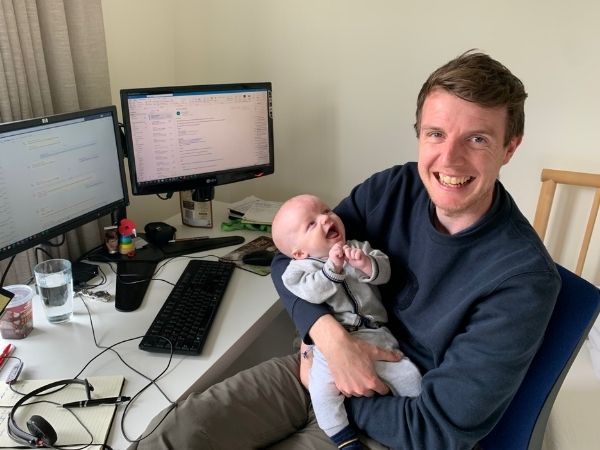
Gareth Beck and his 4-month old son
Most of us have felt anxious, depressed or overwhelmed at work at some point. Gareth Beck was on his way towards burnout last year while working day and night during lockdown. Luckily a colleague at Aurecon noticed this and recommended he speak to a counsellor. A little time off and reassessing his work and life priorities helped him to recharge his batteries. He also turned to a simple yet effective tool for managing mental health
”As I was staring down the barrel of burnout, I kept a diary of the positive things I noticed throughout each day.
”Like anyone, if you have done nine great things and one not-so-great thing, you’ll ruminate on the not-so-great thing, which chips away at your mental health. Keeping a diary has been a great tool for me. I reflect on my diary and look at the great things I’ve accomplished inside and outside of work.”
Gareth says employers should care about their staff mental health and wellbeing not only because it’s the right thing to do but because it helps with recruitment, retention and increases morale and engagement, it can help create a positive return on the bottom dollar.
”Having a mentally healthy workplace means that staff will repay you through better work, more engagement and performance. Studies have shown that investing one dollar will positively return that investment from $2 to $12.
”When a workplace is inclusive of people with mental health conditions, it causes a ripple effect through the business and will positively influence community knowledge and attitudes towards mental health. Those who are mentally healthy are less likely to get injured and hurt during the work day too.”
Gareth says there is a tonne of things a workplace can do to create a mentally healthy environment.
”Firstly, it’s great that so many businesses are now focusing on mental health. COVID has shed light on wellbeing.
”The best place to start is to talk to your staff about what they see as the areas impacting their mental health and wellbeing. Look at things that are going well in the business and things that you can all improve on.
”At Aurecon, what worked for us was training staff in mental health first aid, which started to have a ripple effect in the business through conversations happening as well as people who were strong enough to stand up and tell their story.
”Our New Zealand Managing Director Tracey Ryan and Aurecon’s leadership team have been vocal around telling their own stories, which has created a psychologically safe space for people to speak up with their mental health challenges.
”We know that everyone needs good mental health – it’s a normal part of our day at Aurecon to provide resources to help our people proactively manage their mental health. We hold sessions on mental health topics, counsellors visit the office regularly to normalise the conversation, and during the lockdown we provide virtual events for our staff’s kids.”
Gareth says there is no perfect answer to a workplace starting the mental health and wellbeing journey.
”Businesses are still finding their way. An excellent place to start is looking at the guidance through the ISO45003 standard. As well as this, NSW has an informative and practical code of practice about psychosocial hazards at work.
”Businesses tend to focus on the reactive part of the equation like EAP and Mental Health First Aiders – which are great and part of the solution; however, there needs to be a focus on the proactive side. Things such as looking at what’s working well and understanding the conditions and processes that contribute to the flourishing or optimal functioning of people within the organisation.
”We have a way to go. Before COVID, stats from the UK showed nearly half of all working days lost annually to non-fatal workplace injuries/illnesses were due to work-related stress, anxiety and depression. It’s pretty sobering to hear and makes me wonder what it would be for Aotearoa, given we don’t have this data.
”That reason alone is enough to keep shining a light on Mental Health Awareness Week.”
